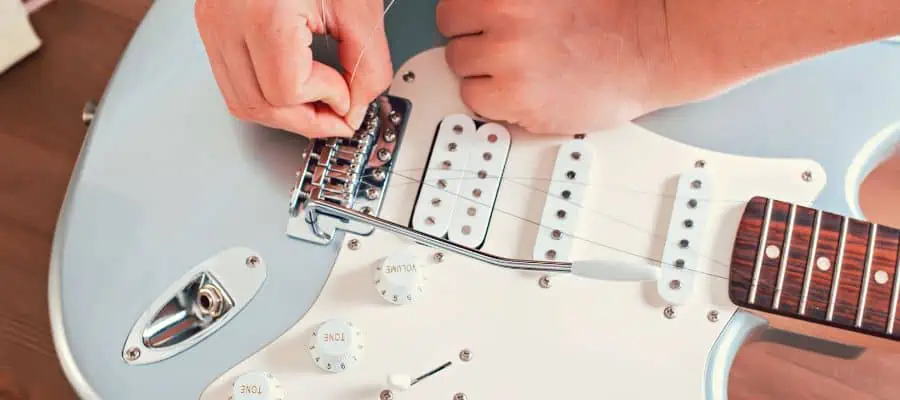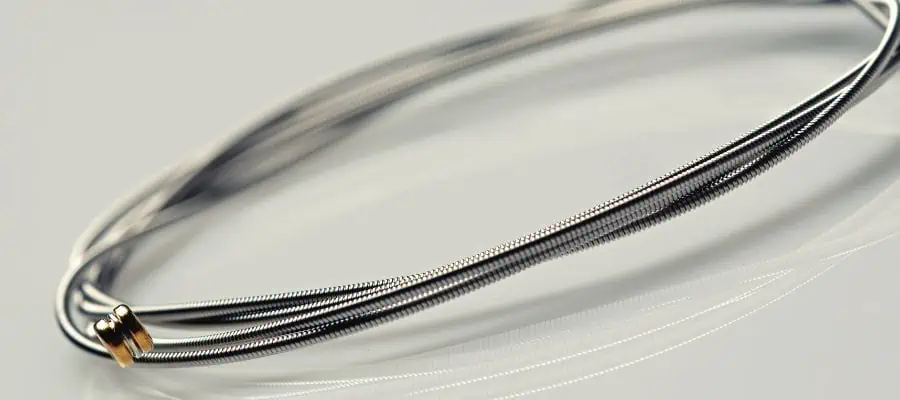Sometimes, when you try to play your guitar right after restringing it, you may notice a buzzing effect that makes the sound unpleasant. If you’re just noticing this effect for the first time, you may be worried you did something wrong when changing the strings and may be considering starting over. However, you shouldn’t be quick to worry; there are several reasons why this happens, and there are plenty of solutions.
Your string is buzzing after restringing because you may be using a new string gauge or have changed your tuning. Additionally, you may not have set up your guitar correctly or are having issues with your technique. Other reasons include the humidity in your room or an improperly adjusted pickup.
In the rest of this article, I’ll explain all the possible reasons why your guitar strings are buzzing after restringing. Additionally, I’ll provide different solutions that you can try to solve this problem. Let’s get started!
What Causes the Strings To Buzz After Restringing?

If you’ve just noticed the buzzing effect on your guitar sounds and are worried you made a huge mistake, you should calm down; seasoned guitarists know this is a common issue that can be solved easily. Most guitarists call this effect the fret buzz; it’s a weird and slightly annoying sound that a few different factors can cause.
The main reason behind fret buzz is low action, which may be because of a lack of neck relief, high string tension, and low action, which are all connected. There are several reasons that can lead to these issues.
String Gauge
When you change the string gauge you regularly use, you may experience fret buzz on your instrument. This is due to the tension change on the strings as well as the shape of the neck. Thicker gauge strings won’t be a problem, but if you start to use thinner gauge strings than your regular ones, fret buzz may happen.
String Material

The string material also plays a role in string tension and the neck shape. Because of the change in the core material of the string, the string tension changes. Heavier strings will create more tension, while lighter strings create lower tension, leading to a lack of neck relief and low action, which opens the way to fret buzz.
Steel strings are usually the lightest, followed by nickel strings. Then comes bronze strings, while nylon strings are the heaviest. So, even if you use the same gauge, if you change the guitar string type you use, you may suffer from fret buzz.
Alternative Tunings
If you’ve never changed your tuning before, you may notice the buzzing sound when you suddenly lower or raise it, especially without setting up your guitar.
When you tune your strings a lower tuning, the tension on the strings gets lower. Low tension means the strings will be closer to the fretboard, and without a proper setup most likely it will leads to fret buzz.
Mistakes During Setup
When you restring a guitar, you need to consider that you may be affecting several different aspects without even knowing. Typically, when you adjust your guitar, you may be affecting a few others in the process if you don’t take the right measures.
Some of the most common issues during setup that can create a buzzing sound are low action and insufficient neck relief. Downtunings and lighter gauge strings also buzz because of this issue.
Additionally, the frets may not be at the same height; this may cause buzzing sounds when the string makes contact with the taller fret.
You need to make sure the guitar is set up correctly; take it to a professional for a proper setup if you’re not sure how to do it. Even more experienced guitar players take their guitar to an expert because this process may take a long time and a lot of effort, even for someone who has been playing the guitar for years.
You’re Not Pressing the String Correctly

Sometimes, the issue is not in the way the guitar is set up or the string types but simply in the way you’re using it. Some inexperienced players may have a hard time with this buzzing sound because they are not pressing the new strings correctly.
For instance, new guitar players may not be able to apply the right pressure on the string. If you don’t press on the string properly, you will notice the buzzing effect as the string makes contact with the fret. Additionally, you may also have issues with the placement of your fingers against the frets, which may once again cause the buzzing sounds.
Humidity
You may be surprised to hear this, but the humidity in your room also makes a difference in how your guitar sounds. This is particularly noticeable with an acoustic guitar since their sound is more “naked” and dependent on the wooden top.
The wood that guitars are made of can be affected by the humidity in the air, just like any other piece of wood would. As a result, a too-humid or too-dry atmosphere would make a significant difference in the way your guitar sounds.
If the humidity is below 40% where you play or store your guitar, the wood can dry out, and the top may fall down. This will lead to the fret buzz on the upper registers.
The Pickup Is Too Close to the Strings
If you have ruled out every issue, you may need to check the guitar pickups. This is only an issue with electric guitars, which have pickups that convert the vibrations of the strings into electricity. The pickups contain magnets, which may create a buzzing sound as they interact with the metal strings if they are too close.
How To Fix Strings That Buzz After Restringing

Once you have determined the cause of the buzzing sound, you can find ways of solving these issues. You can try several different solutions, including the following:
- Take the guitar for a setup. Go to an expert to ensure everything is correctly set up before restringing. Do the same before you change the tuning of your guitar. A good setup will fix the fret buzz if the issue is not your technique or humidity.
- Practice continuously to improve your technique. If the buzzing is caused by you not applying the right pressure or not placing your fingers in the right position, you should practice to get rid of the effect.
- Keep your guitar in an environment with moderate humidity. Typically, your guitar should be fine in a 50% humidity environment, give or take 10%. If the air inside your room is too dry, consider using a humidifier or moving your guitar to another space.
- If the pickups are causing the buzzing sounds, adjust them accordingly. Keep them at an appropriate distance that will not affect the sound of your electric guitar.
Conclusion
The fret buzz is a pretty common effect that can happen after you restring your guitar. Several factors can affect this problem, including improper setup, a new string gauge or type, or a change in tuning. Other factors include your technique and the humidity of the environment.
The number one way to fix this issue is to take it to an expert to set up your guitar correctly. Moreover, you should practice your technique to avoid buzzing and find the right environment to keep your guitar in.
If you found this article useful, you may want to save this pin below to your Guitar board.

Recent Posts
Some guitarists insist on buying an expensive amplifier with their electric guitar. They assume that this is a must for every type of guitarist out there. However, in some situations, this isn’t...
Top 50 Free Realistic Guitar VST Plugins With Sound Examples
As technology has rapidly advanced in the recent decade, computers are stealing more and more roles from physical musical instruments and accessories. Nowadays, you do not need expensive amps,...

